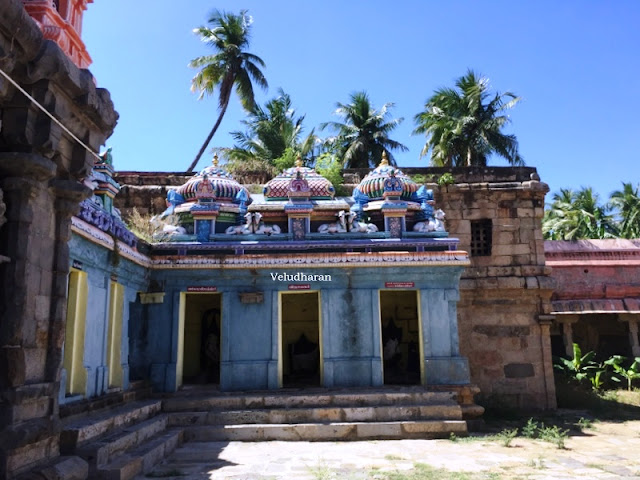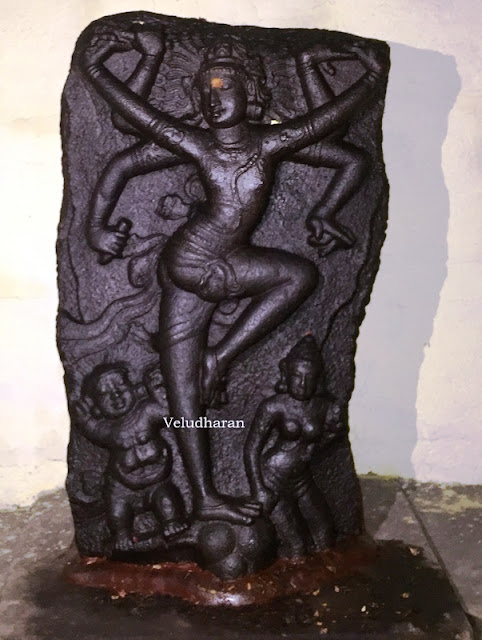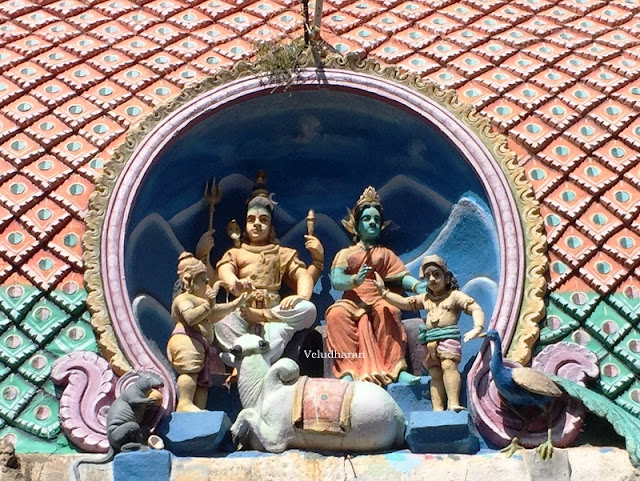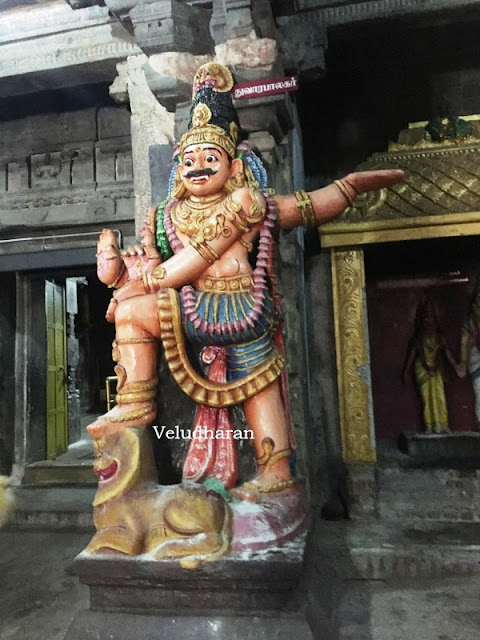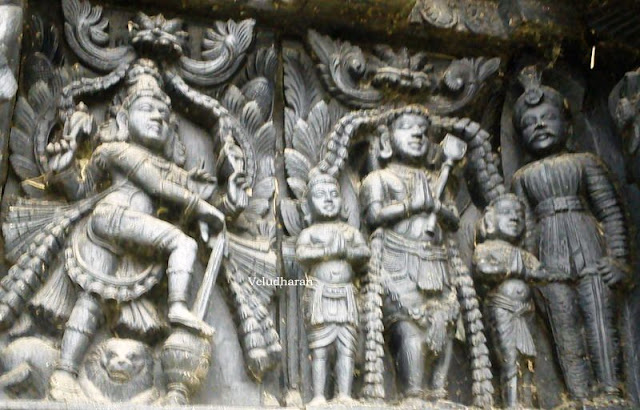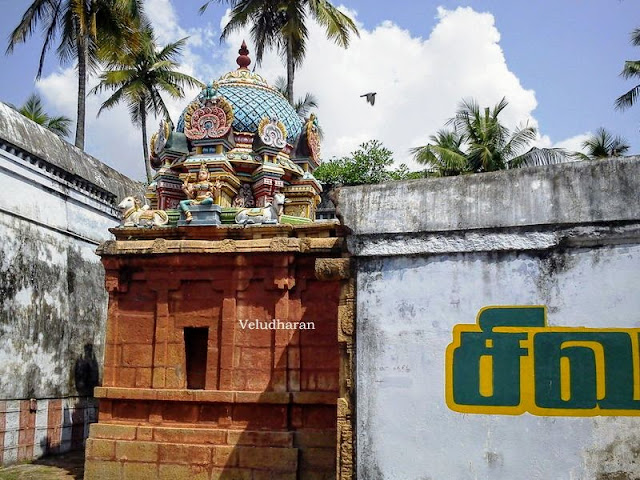This
is the 108th Thevara padal Petra shiva Sthalam and 54th sthalam
on the north side of river Kaveri in Chozha Nadu. This is one of the few temples
that have Palm trees as sthala Vruksham. Since the river Kollidam flows from
south to north (as Utharavahini), the temple is considered equivalent to
Kashi.
In
Periya Puranam, Sekkizhar records that
Thirugnanasambandar came to this temple after worshiping Lord Shiva of
Thiru Neithanam and stayed some days at this temple.
செங்கைமான்
மறியார்தம் திருமழபா டிப்புறத்துச் சேரச் செல்வார்அங்கைஆர்
அழல் என்னும் திருப்பதிகம் எடுத்தருளி அணைந்த போதில்மங்கைவாழ்
பாகத்தார் மழபாடி தலையினால் வணங்கு வார்கள்பொங்குமா
தவமுடையார் எனத்தொழுது போற்றிசைத்தே கோயில் புக்கார்
Thirugnanasambandar,
Thirunavukkarasu Swamigal, Sundarar, Ayyadigal Kadavarkon, and Vallalar have sung
hymns in praise of Lord Shiva of this temple.
அங்கை
யார்அழ லன்னழ கார்சடைக்கங்கை
யான்கடவுள் இடம் மேவியமங்கை
யான்உறை யும்மழ பாடியைத்தங்கை
யால்தொழு வார்தக வாளரே.........
திருஞானசம்பந்தர்நீறேறு
திருமேனி யுடையான் கண்டாய் நெற்றிமே
லொற்றைக் கண் நிறைந்தான் கண்டாய்கூறாக
உமைபாகங் கொண்டார் கண்டாய் கொடியவிட
முண்டிருண்ட கண்டன் கண்டாய்ஏறேறி
யெங்குந் திரிவான் கண்டாய் ஏழுலகும்
ஏழ்மலையு மானான் கண்டாய்மாறானார்
தம் அரணம் அட்டான் கண்டாய் ’மழபாடி
மன்னு மணாளன் றானே.........
திருநாவுக்கரசு சுவாமிகள்பொன்னார்
மேனியனே புலித்தோலை அரைக்க்சைத்து மின்னார்
செஞ்சடைமேல் மிளிர் கொன்றை அணிந்தவனேமன்னே
மாமணியே மழபாடியுள் மாணிக்கமேஅன்னே
உன்னையல்லால் இனியாரை நினைக்கேனே...........சுந்தரர்இழவாடிச்
சுற்றத்தார்வ் எல்லாரும் கூடிவிழவாடி
ஆவி விடாமுன்னம் – மழப்பாடிஆண்டானை
ஆரமுதை அன்றயன்மால் காணாமைநீண்டானை
நெஞ்சே நினை ...........ஐயடிகள்
காடவர்கோன் --
விரும்பிநிதம்பொன்னுங்
கெளத்துவமும் பூண்டோன் புகழ்ந்தருளை மன்னு
மழபாடி வச்சிரமே...........திரு
அருட்பாMoolavar : Sri Vaidyanathaswami, Sri Vajrathamba NatharConsort : Sri Azhagammai, Sri Sundrambigai, Sri
Balambigai
Some
of the important features of the temple are......The
temple faces east with a 7-tier Rajagopuram. Balipeedam, Rishabam, and dwajasthambam are
after the Rajagopuram. The second level Rajagopuram is of 3-tiers. Alangara mandapa and two Rishabas are after the second level Rajagopuram. In this
prakaram Agora Veerabhadra, Vinayagar, and Murugan. The Maha mandapam with
sanctum sanctorum is after the 3rd level entrance. Sanctum Sanctorum
and Somaskandar Temple are combined together and look big. Urchavars and
Jurahareswarar are in the mandapa.
Moolavar is of Swayambhu Shiva Linga believed to be installed by Purusha
Miruga. The Stucco Dwarapalakas are huge in size. There are three small
pits/ kuzhi in the sanctum, which are treated as Navagrahas and there is no separate
Navagraha sannathi. In Koshtam, Vinayagar, Agathiyar, Dakshinamurthy,
Lingothbavar, Brahma and Shiva Durga.
In
kostam, there are two Dakshinamurthys two Rishabas, and two Ambal sannidhis.
Somaskandar is made up of single stone and looks very beautiful. In front of this, there are two Vinayagars one is in standing and the other in sitting posture.
In
the praharam sannadhi for Vishnu & Saraswati, Sundarar & Paravai
Nachiyar, Mahavishnu & Mahalakshmi, Jurahareswarar, Gaja samhara moorthy, Saptamatrikas,
Gajalakshmi, Kala Bhairava, Guru Bhairavar, Arthanareeswarar, Meenakshi with
Chokkanathar, 4 Veda Nandhis/ Rishabas, Shiva Lingas, Sri Valli Devasena
Subramaniar, Moovar, 63 var, Stucco images of Nandhikeswarar with Suyashambiga,
Gaja Samhara moorthy, and Kathyayini.
There
are two Ambal Sannadhis, Balambiga and Sundrambiga. Ambal Balambigai is in a
separate temple like sannadhi with a sanctum and artha mandapam facing south. Two
tier mandapam along the outer walls are of Nattukottai Nagarathar’s thirupani.
The
sanctum sanctorum consists of sanctum, antarala and Artha mandapam.
HISTORY AND
INSCRIPTIONSThe
original temple might have existed before the 7th Century. The
inscriptions recorded belong to Paranta-I, Rajarajan-I, Rajendran-I,
Rajathirajan-I, Rajendran-II, Kulothunga Chozha-I, Vikrama Chozha, Kulothunga Chozha-II & III, Sadayavarman Sundara Pandyan and Hoysala King Veera
Someswaran.
Historians
believe that Vaidyanathar sannadhi is the Jurahareswarar Sannadhi
and the same belongs to the Rajaraja-I period.
100
pillar mandapam, and Somaskandar mandapa
are built during 13th Century, Kulothunga-III period. The outer
prakara entrance Rajagopuram was built during the Pandya period,. The mandapa opposite the temple called
Koneri mandapam was built by Konerirayan of the Vijayanagara Dynasty.
The
Chozha period inscriptions record the donation of Sheep / Goats for burning
perpetual lamps, Vimana renovation, land for the naivedyam, Creating Nandhavanam, Kamugu farm, land towards bringing water for Thirumanjanam/sacred bath,
As
per the inscription Lord Shiva was called Thirumazhuvadi Udayar,
Thirumazhuvadi Azhvar, Thirumazhuvadi Mahadevar, Mazhuvadi Udaya Mahadevar,
Rajendran period inscription mentions as Thirumazhuvadi Sri Vaichiyanatha
Thevvar, Thirumazhapadi Udayar Nayinar Thirumeni Ponnarmeniyan, and Ambal
Balambiga was called as Bhuvanaapathi Nachiyar, established during Rajarajan
–III and reconstructed by Nattukottai Nagarathars. This place was called Thirmazhuvadi and later called Thirumazhapadi, Rajarajavalanattu Poikai Nattu
Devadhanam Thirumazhuvadi, Thiribhuvana Muzhuthudaya Vala Nadu, etc. Changed
its territory depends on the Kings ruled during that period.
As
per the inscriptions and records the temple had 464 acres of Land, of which
nanjai was 232 acres & 61 cents and punjai was 230 acres and 4 cents. 147 acres and 75
lands are in dispute and under court case, The primary school, living quarters for
Archakar, servants, and meikavalar, the in-charge belongs to this temple, and rent
(?) is paid to the temple. As per the 1970
record the jewellery worth Rs 18237 was with the incharge, Rs 223.25 worth
of Kanda birunda mala and 32 flower garland was with the temple’s incharge.
During the Rajaraja-I period inscription records that, the Vimana was reconstructed. The
inscriptions already available are copied and reinscribed after completion. As
per the experts lot of mistakes are made
during reinscription.
Rajendra
Chozha-I’s inscription 13th-year inscription records the endowment
of burning a perpetual lamp and Shiva is called Thirumazhuvadi Sri
Vaichiyanatha Thevar. The same King’s 22nd-year inscription records
the endowment of Ivory leg cot and some materials to Palliyari.
From
Kulothunga-III and Hoysala King Veera Ramanathan period inscriptions, (13th
Century) it is understood that
Vaidyanathar was called Jurahareswarar.
Vikrama
Chozha, Rajarajan-III, Hoysala, and Pandya period 26 inscriptions record the
endowment of Thirumanjanam for Lord Shiva and people are appointed to bring
water from river Kaveri for which donations are made to this temple. A separate
path called “Thirumanjana Veethi”/Thriumanjana Peruvazhi was created to bring water. (As per Historians the
river Kollidam was faraway during that time and the river was also not wide like
this day. The river course changed after the 13th century. Moreover, it was believed that the Kollidam River might have not been considered holy water).
Koparakesari
barmar’s 3rd year reign inscription records the endowment of
Naivedyam with 2 nazhi rice and to feed 5 persons with the naivedyam offered on
Thiruvathira nakshatra day of every month by, Vaivalipakkam Udayan Perumannandi
of Vesalippadi and for the same 10
Kalanju gold gifted.
Another
Koparakesari barmar’s 4th-year reign inscription records the
endowment of burning a day lamp by Kandan Malapadi of the Pudukkudi in
Kilsengili Nadu for which 45 sheep and a ram were gifted to this temple. Another 5th-year reign inscription
records the endowment of burning a perpetual lamp for which 90 Sheep were
donated by Nakkan Kanjan of Thanjavur Nadu. Another inscription records 90 Sava
moova peradu for burning a perpetual lamp.
Koparakesari’s 10th-year reign inscription records that his Queen Nakkan Thillai Azhagiyar Chozhamadeviyar,
Panchavan Madevi gifted a Silver Vessel weighing 77.75 kalanju or 5 palam for offering Adaikayamuthu
/ beetle nut with leaves, May probably be assignable to Uttama Chozha, but the continuation inscription mentions Sundara Chozha.
Koparakesari’s 16th-year reign inscription records the gift of a Bronze idol of
Kolgai Devar, for receiving Sri Bali and a silver tray for offering
Adaikayamuthu/Betel nut, by Achchan Dhurjati. This inscription may be
assignable to Utama Chozha.
One of the Krishnadevaraya period inscriptions at Engoi Malai temple ( 63rd
and last Paadal Petra Sthalam of Kaveri Vadakarai ) records that land was
donated to this Thirumazhapadi Sri Vaidyanatha Swami Temple towards worship.
LEGENDSDuring
ancient times this place was ruled by the Mazhavar group and hence called Mazhavarpadi, which turned into Mazhapadi. Padi means – a place for the army to
stay. When Kollimazhavan ruled this area his army – Mazhavar Senai, was stationed here. Hence this place was
called Mazhapadi.
As
per Sthala Purana, Lord Shiva gave dance
darshan holding mazhu (one of the
weapons of Lord Shiva) to Markandeya Maharishi. Hence called “Mazhuvadi”,
which turned into the present name of Mazapadi
After
Sundarar worshiped Lord Shiva of Thiruchotruthurai, Thirukandiyur, Thiruvaiyaru, and Thirupoonthuruthi,
finally on that day went to
Thiruvalam Pozhil and stayed at night. Even though this Thirumazhapadi is
on the way, he didn’t come to this temple. Lord Shiva came in his dream in the
form of Young Shiva (Like he came and asked to come to Kanaper – Kalayarkoil)
and said, “Whether you have forgotten me to worship at
Thirumazhapadi - மழபாடியினில் வருவதற்கு நினைக்க மறந்தாயோ?”. The next morning
Sundarar came to this and sang the famous hymn starting with – Ponnar meniyane- பொன்னார் மேனியனே... Which is given above. This was recorded by Sekkizhar in his Periya
Puranam, as given below.
மழபாடியினில்
வருவதற்கு நினைக்க மறந்தாயோ என்றுகுழகு
ஆகிடயதம் கோலம் எதிர்காட்டி அருளக்குறித்து உணர்ந்து நிழல்
ஆர்சோலைக் கரைப் பொன்னி வடபால் ஏறி நெடுமாடம்அழகு
ஆர்வீதி மழபாடி அணைந்தர் நம்பி ஆரூரர்
Maha Vishnu, Indra, Nandhikeswarar, and Purusha mrugam
(similar to Spinx) worshiped Lord Shiva of this temple. Purusha Mirugam took
the Shiva Linga from Brahma’s Satya loka and installed it in this temple. When
Brahma came to know this, he came and tried to take the Shiva Linga back. Since
he couldn’t do it, he exclaimed that-“whether is this a Vaira thuno – இது வைரத்தூணோ". Hence Lord Shiva is called Vairathoon Nathar or Vachirasthambeswarar. Thirunavukkarasu Swamikal
also records in his hymns as “Mazahapadi vairathuno – மழபாடி வைரத்தூணோ“. The hymns are given below
அலையடுத்த
பெருங்கடல்நஞ் சமுதா வுண்டு அமரர்கள்தந்
தலைகாத்த ஐயர் செம்பொன் சிலையெடுத்து
மாநாக நெருப்புக் கோத்துக் திரிபுரங்கள்
தீயிட்ட செல்வர் போலும்நிலையடுத்த
பசும்பொன்னால் முத்தால் நீண்ட நிரைவயிரப்
பலகையாற் குவையார்த் துற்றமலையடுத்த
மழபாடி வயிரத்தூணே யென்றென்றே
நானரற்றி நைகின் றேனே
This
Legend is associated with Nandhikeswarar. Sage Siladha, who belongs to
Andhanakuruchi near Thiruvaiyaru prayed Lord Shiva for a Child. Lord Shiva gave
him a male child. On that day evening, Lord Shiva called Nandhi and arranged for
a sacred bath with Surya Theertha, Chandra Theertha, the foam water that drips
from Nandhi’s (Rishaba) mouth, Kaveri
river water and the milk from Ampal’s breast. He was given the title of
“Adhikara Nandhi” and made in
charge of the Temple. On Panguni (March – April) Punarpoosam nakshatra day
Lord Shiva arranged a Marriage for Nandhikeswarar with Suyashambiga, daughter of
Vygrapadar and granddaughter of Vasishter at Thirumazhapadi.
On
that day all the Saptha Sthana Temple’s Urchavars will join with Thiruvaiyaru
urchavars and proceed to Thirumazhapadi in procession. Since Nandhikeswarar’s
wife Suyashambiga belongs to Thirumazhapadi, all the people of the Village will decorate with flower & Mango leaf Thoranas,
erecting Pandals, celebrating the
marriage as their own house function. In the evening at Thirumazhapadi all the
seven temple’s urchavars will arrive and the Marriage function will be celebrated
in a grand manner.
It
is believed that the temple tank water has miraculous powers. Those who are
infected with skin diseases, have to take a bath in the tank and worship Lord
Shiva as Vaidyanatha Swami of this temple will get relief. It is also believed
that those who could not go to Vaitheeswaran Koil can offer their prayers and pooja
in this temple.
POOJAS AND
CELEBRATIONSApart
from regular poojas, special poojas are conducted on monthly pradosam, Maha
Shivaratri in the month Masi (Feb – March), Masi Maha 12 days Brahmotsavam/Thiruvizha
in the month Masi (Feb – March), Nandhikeswarar Marriage festival in the
month Panguni (March – April), Ezhur Thiruvizha in the month Chithirai in
which Urchavar will go to Thiruvaiyaru, Annabhishekam
in the month Aippasi (Oct - Nov) and Thirukarthigai in the month Karthigai (Nov – Dec) are celebrated in a grand manner.
TEMPLE TIMINGSThe
temple will be kept open between 06.30 hrs to 12.00 hrs and 16.00 hrs to
20.00 hrs.
CONTACT
DETAILS:Landline and mobile numbers +91 4329 292 890
and +91 97862 05278.Ganesha Gurukkal may be contacted on his mobile numbers +918525938216, +91 9843360716, and +91 9786205278 for further details.
HOW TO
REACH :Bus
facilities are available from Tiruchirappalli and Thanjavur. Bus
facility is also available from Thirumanur, which is 6 KM from Thiruvaiyaru on Ariyalur
road.The
temple is 6 KM from Thirumanur, 15 KM from Thiruvaiyaru, 28 KM from Thanjavur,
28 KM from Ariyalur, and 54 KM from Tiruchirappalli.The nearest
Railway Stations – Ariyalur, the district headquarters, and Thanjavur are the same
distance.
LOCATION OF THE
TEMPLE: CLICK HERE
பொன்னார்
மேனியனே புலித்தோலை அரைக்க்சைத்து
நீண்டானை
நெஞ்சே நினை
பொன்னுங்
கெளத்துவமும் பூண்டோன் புகழ்ந்தருளை
குழகு
ஆகிடயதம் கோலம் எதிர்காட்டி அருளக்குறித்து உணர்ந்து
அமரர்கள்தந்
தலைகாத்த ஐயர் செம்பொன்
This
Legend is associated with Nandhikeswarar. Sage Siladha, who belongs to
Andhanakuruchi near Thiruvaiyaru prayed Lord Shiva for a Child. Lord Shiva gave
him a male child. On that day evening, Lord Shiva called Nandhi and arranged for
a sacred bath with Surya Theertha, Chandra Theertha, the foam water that drips
from Nandhi’s (Rishaba) mouth, Kaveri
river water and the milk from Ampal’s breast. He was given the title of
“Adhikara Nandhi” and made in
charge of the Temple. On Panguni (March – April) Punarpoosam nakshatra day
Lord Shiva arranged a Marriage for Nandhikeswarar with Suyashambiga, daughter of
Vygrapadar and granddaughter of Vasishter at Thirumazhapadi.









